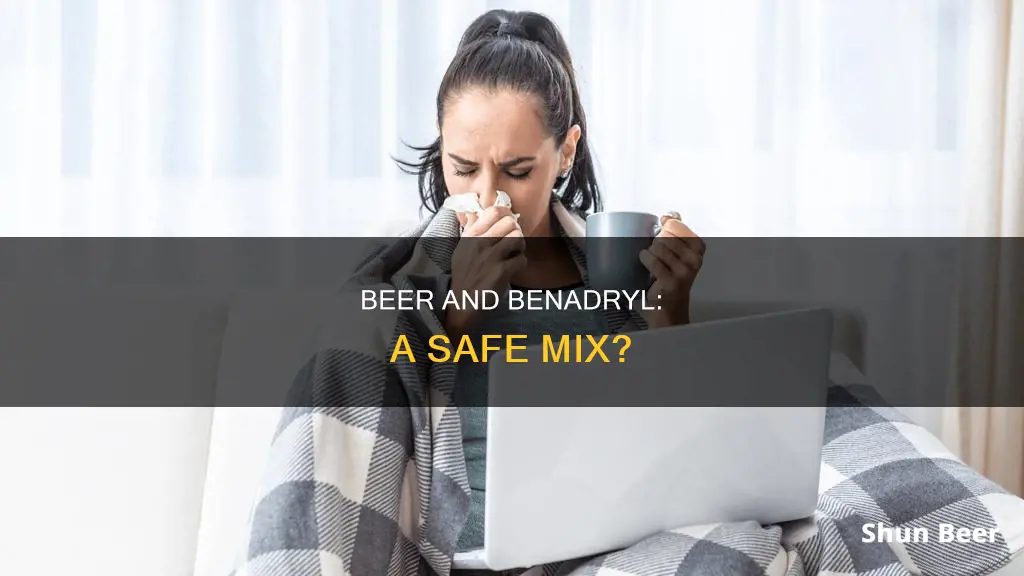
Benadryl is a popular over-the-counter medication used to treat allergy symptoms. It is an antihistamine that helps to reduce symptoms such as rashes, coughs, and irritated eyes, nose, and throat. While Benadryl can be easily purchased without a prescription, it is a strong drug that can have dangerous side effects when mixed with other substances, especially alcohol. Both Benadryl and alcohol are central nervous system (CNS) depressants, which means they slow down the CNS, leading to potential problems with concentration and physical tasks. Mixing these two substances can intensify side effects such as drowsiness, dizziness, impaired coordination, and difficulty with cognitive tasks, increasing the risk of accidents, falls, and even overdose. In addition, combining Benadryl with alcohol can lead to dehydration, memory impairment, and negative interactions with other medications. While the risks may vary depending on individual factors such as age and other medications, it is generally medically advisable to abstain from alcohol completely while taking Benadryl to avoid any adverse outcomes.
| Characteristics | Values |
|---|---|
| Should you drink beer while taking Benadryl? | No, it is not recommended to mix Benadryl and alcohol. |
| Why is it dangerous? | Both substances are central nervous system (CNS) depressants, which can lead to severe side effects such as drowsiness, sedation, impaired coordination, and difficulty performing physical and mental tasks that require alertness. |
| What are the risks? | Increased risk of accidents, falls, overdose, respiratory depression, and other life-threatening problems. |
| Who is at higher risk? | Older adults, people with certain health problems, and women may be more susceptible to adverse effects. |
| How long should you wait after taking Benadryl before consuming alcohol? | It is recommended to wait at least 24 hours, or until the Benadryl has fully left your system (typically about 2 days). |
What You'll Learn

CNS depression
Benadryl (diphenhydramine) and alcohol are both central nervous system (CNS) depressants. This means they slow down the CNS, which is made up of the brain and spinal cord. When taken together, they can cause the CNS to slow down too much, leading to CNS depression.
- Problems with concentration
- Difficulty with physical tasks
- Drowsiness
- Sedation
- Impaired coordination
- Trouble with mental tasks that require alertness
- Loss of consciousness
- Respiratory depression
The combination of Benadryl and alcohol can lead to dangerous levels of CNS depression, increasing the risk of accidents, falls, and overdose. It may even result in life-threatening problems, such as respiratory depression or coma. Therefore, it is medically advisable to abstain from alcohol completely while taking Benadryl.
If you or someone you know has unintentionally mixed Benadryl and alcohol, it is important to ensure they are in a safe environment where they can rest.
Old Beer: Is It Safe to Drink After 30 Years?
You may want to see also

Increased risk of accidents
Mixing Benadryl and alcohol can have serious consequences, including an increased risk of accidents. Both substances are central nervous system (CNS) depressants, which means they slow down the CNS. This can lead to problems with concentration and physical tasks, such as driving or operating machinery. The National Highway Traffic Safety Administration suggests that Benadryl may have a greater effect on a driver's ability to stay alert than alcohol. Combining these substances can also increase the risk of falls, especially in older adults. This is because Benadryl and alcohol can impair motor skills and coordination, making it harder to control body movements.
The risk of accidents is further heightened by the fact that both Benadryl and alcohol can cause dehydration, which can lead to discomfort and a worsened hangover the next day. Additionally, the combination of these substances can result in extreme drowsiness and sedation, which can impair alertness and increase the risk of accidents. It is important to note that even small amounts of alcohol can amplify these side effects, so it is best to abstain from alcohol completely while taking Benadryl.
The dangers of mixing Benadryl and alcohol are not limited to the risk of accidents. This combination can also lead to respiratory depression, memory impairment, and other life-threatening problems. It is important to consult a healthcare professional before combining any medications or substances, including Benadryl and alcohol, to ensure your safety.
Celiac-Friendly Dark Beer: What You Need to Know
You may want to see also

Dehydration
The human body is composed of about 60% water, and adequate hydration is essential for its proper functioning. Dehydration occurs when the body loses more water than it takes in, leading to a deficiency of water in the system. This can be caused by various factors, including not drinking enough fluids, excessive sweating, and certain medications or substances, such as alcohol and Benadryl.
When the body is dehydrated, it cannot perform its normal functions properly. Water is needed for digestion, absorption, circulation, and the creation of saliva. It also helps to regulate body temperature and maintain blood pressure. Dehydration can lead to a range of symptoms, including:
- Thirst
- Dry mouth
- Fatigue
- Dark-coloured urine
- Dizziness
- Confusion
- Headache
- Constipation
In severe cases of dehydration, hospitalisation may be required to administer fluids intravenously.
To prevent dehydration when taking Benadryl, it is important to avoid alcohol and ensure adequate fluid intake. Staying hydrated can help the body process and eliminate the medication, reducing the risk of dehydration and other side effects. It is also important to be mindful of other sources of alcohol, such as cough syrups and mouthwashes, which can interact with Benadryl and further increase the risk of dehydration.
Beer and Low FODMAP Diet: What's the Verdict?
You may want to see also

Memory impairment
Mixing Benadryl and alcohol can have several adverse effects on the body, including memory impairment. Benadryl is a branded version of diphenhydramine, an antihistamine used to treat allergy symptoms. It is available over the counter and does not directly affect the liver. However, both Benadryl and alcohol are central nervous system (CNS) depressants, which means they slow down the CNS. When combined, they can trigger dangerous side effects, including:
Benadryl blocks the action of acetylcholine, a neurotransmitter necessary for learning and memory. Alcohol also inhibits learning and memory temporarily. Therefore, combining Benadryl and alcohol can have a more noticeable effect on memory and cognitive function. This effect may be more pronounced in older adults as their bodies take longer to break down alcohol, increasing the time they are exposed to the harmful interaction between Benadryl and alcohol.
To avoid memory impairment and other adverse effects, it is medically advisable to abstain from alcohol completely while taking Benadryl. If you are considering mixing these substances, refrain from any tasks requiring mental alertness, and do not operate vehicles or machinery. The potential risks of combining Benadryl and alcohol should not be taken lightly, as they can lead to severe side effects and even death.
Beer and Pseudoephedrine: A Safe Mix?
You may want to see also

Interactions with other medications
Benadryl and alcohol should not be mixed, as both are central nervous system (CNS) depressants, which slow down the CNS. This can lead to drowsiness, sedation, and impaired coordination, increasing the risk of accidents, falls, and overdose. Combining these substances can also cause respiratory depression and other life-threatening problems.
The risks associated with mixing Benadryl and alcohol are heightened for individuals who are also taking other medications. Benadryl is known to interact with several types of medications, including:
- Stomach ulcer medicine
- Cough and cold medicine
- Other antihistamines
- Sleep aids
Taking these medications with Benadryl and consuming alcohol can increase the intensity of side effects and heighten the risk of adverse outcomes. It is imperative that individuals taking Benadryl consult with their healthcare provider to discuss potential interactions with other medications and the safety of consuming alcohol.
Additionally, some medications may contain hidden sources of alcohol. For example, cough syrups and laxatives can contain up to 10% alcohol. Individuals taking Benadryl should carefully read the labels of all medications they are taking to avoid accidental interactions or misuse.
The combination of Benadryl and alcohol can be especially dangerous for older adults. Aging slows down the body's ability to break down alcohol, increasing the time that an older adult is at risk of harmful interactions between Benadryl and alcohol.
Beer Coolers: Understanding the Science of Cold
You may want to see also
Frequently asked questions
No, it is not recommended to mix Benadryl and alcohol. Both substances are central nervous system (CNS) depressants, and taking them together can lead to adverse effects such as increased drowsiness, dizziness, impaired coordination, and difficulty performing physical and cognitive tasks.
Mixing Benadryl and alcohol can intensify side effects and impair daily functioning. This combination may lead to dangerous situations, such as driving or operating heavy machinery, and can be life-threatening. It can also increase the risk of dehydration, memory impairment, and interactions with other medications.
Older adults or seniors should be particularly cautious when it comes to mixing Benadryl and alcohol. Aging slows down the body's ability to break down alcohol, and the combination can create problems with motor skills due to the increased risk of dizziness and sedation. This heightens the risk of falls, which is especially problematic for the elderly.
Symptoms of overdose may include extreme drowsiness, confusion, slowed breathing, and even loss of consciousness. If you or someone you know is experiencing these symptoms, seek immediate medical attention.
It is recommended to wait at least 24 hours after taking Benadryl before consuming alcohol. This allows the Benadryl to clear from your system and reduces the risk of adverse effects. However, always consult a healthcare professional for specific advice.







